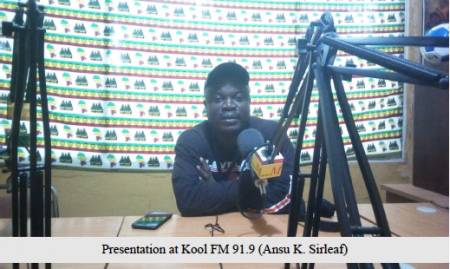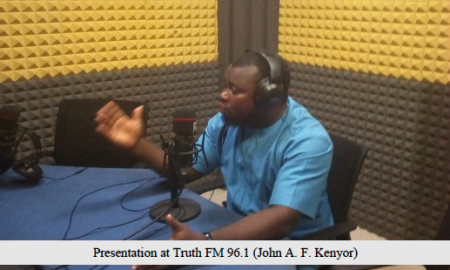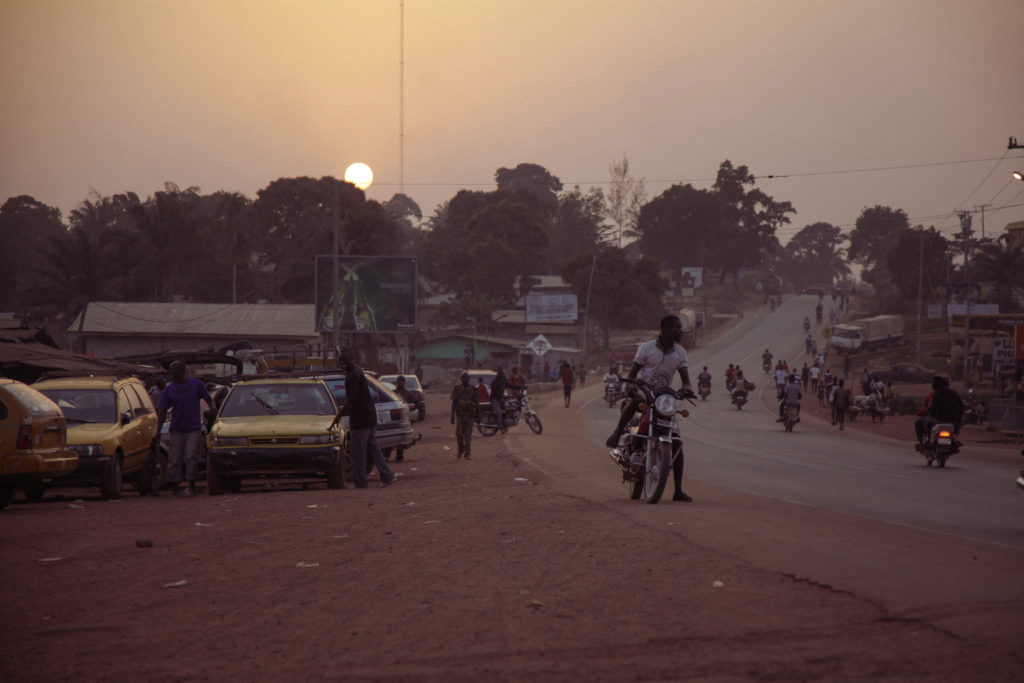
SUMMARY
![]()
Ex-combatant and conflict-affected youth make up the vast majority of Liberia’s 175,000 motorcycle taxi drivers. Motorcycling emerged after Liberia’s civil war as a critical economic sector. It provides cyclists with economic livelihood opportunities and constitutes a space of socio-political youth mobilisation. Through motorcycling, young riders also establish themselves as active peacebuilding subjects, enacting their own ideas to counter the insecurity and marginalisation of post-war life. Motorcycling offers a unique vantage point to understand the long-term post-war challenges facing youth and the multiple roles that young people play after war.
This ongoing, multi-year project by Jaremey McMullin started in 2018 and draws from qualitative interviews, focus groups, and participant observation with young cyclists, union leaders, the motorcyclists’ security force (Task Force), and government and civil society stakeholders across multiple sites in Liberia, focused on parking stations (taxi ranks) in Monrovia, Weala Town, Ganta (Gompa City), and Tubmanburg (Bomi).
The project’s objectives are, first, to interpret the multiple meanings (economic, social, and political) that ex-combatant and conflict-affected youth attach to their participation and association in motorcycling; and second, to analyse how motorcycling is simultaneously a conflict-producing and conflict-mitigating site within post-war Liberia.
Research questions include: How do ex-combatants articulate the significance and meaning of livelihood activities, and in what ways do they articulate motorcycling as a site of post-war well-being? How do they relate labour mobilisation to broader post-war political reintegration? How do young people generate and contribute their own peacebuilding strategies after war? And, how can research approaches better collaborate with youth actors to counter ongoing forms of economic, social, and political marginalisation?
Platform for Dialogue and Peace, a Liberian peacebuilding NGO involved in research and participatory action activities to prevent, manage and transform conflict through collaborative action, has provided critical research assistance throughout the project. P4DP has also been the national implementing partner for all project impact generation activities. James S. Shilue, P4DP’s Executive Director, is a co-investigator on the project.
Successive grants from the SFC ODA GCRF have funded the project, under the heading ‘Motoring from War to Peace’. Grant details are:
- ‘Understanding Long-term Reintegration Trajectories of Ex-combatant Youth in Liberia’s Motorcycle Taxi Unions’: £28,113 (2017-2018) & £9,822 (2018-2019)
- ‘Combatting Social Marginalisation and Supporting Educational Attainment, Business Skills, and Safety & Security of Conflict-affected Youth in Liberia’: £8,057 (2018-2019)
- ‘Supporting Social Reintegration of Liberia’s Conflict-affected Youth through Nationwide Counter-stigma Efforts’: £23,074 (2019-2020)
- ‘Violence Prevention and Livelihood Support in Liberia through Police-Cyclist Dialogue’: £12,500 (2021)
Folke Bernadotte Academy, the Swedish Government Agency for Peace, Security, and Development, has also provided funding to evaluate the impact of cyclists’ own ideas about how to promote peacebuilding, livelihood, and educational attainment of youth engaged in the sector. The funding will provide 14 educational scholarships at high school, vocational, and university level to selected cyclists. The grant will also provide numeracy and business skills training for cyclists at selected parking stations (taxi ranks):
- ‘Motorcycling as Post-war Reintegration: Assessing Youth Peacebuilding Strategies in Liberia,’ SEK 348,900/£29,756 (2021-2022).
RESEARCH PUBLICATIONS
![]()
- Jaremey R. McMullin and Evelyn Pauls (forthcoming) ‘Audio-Visual Media: Documentary Filmmaking,’ in Stacey L. Connaughton and Stefanie Pukallus (eds) The Routledge Handbook of Conflict and Peace Communication.
- Jaremey R. McMullin (2022) ‘“What Is the Benefit of this Project?” Representation and Participation in Research on Conflict-affected Youth,’ Conflict, Security & Development, 22:5, 517–541. Open access.
- Jaremey R. McMullin (2022) ‘Hustling, Cycling, Peacebuilding: Narrating Reintegration through Livelihood in Liberia,’ Review of International Studies, 48:1, 67–90. Open access.
Forthcoming publications arising from the project focus on:
- Spaces of reintegration (where reintegration takes place and how to ‘see’ and ‘site’ youth contributions to post-war reintegration);
- Impact of union politics on post-war reintegration of ex-combatants and conflict-affected youth;
- Gender mainstreaming, gendered identities, and the commercial motorcycling sector;
- Urbanisation and Liberian youth;
- Youth-centred peacebuilding strategies;
- Social marginalization, belonging, and economic livelihood; and,
- Linkage between ex-combatant reintegration and security sector reform (SSR)
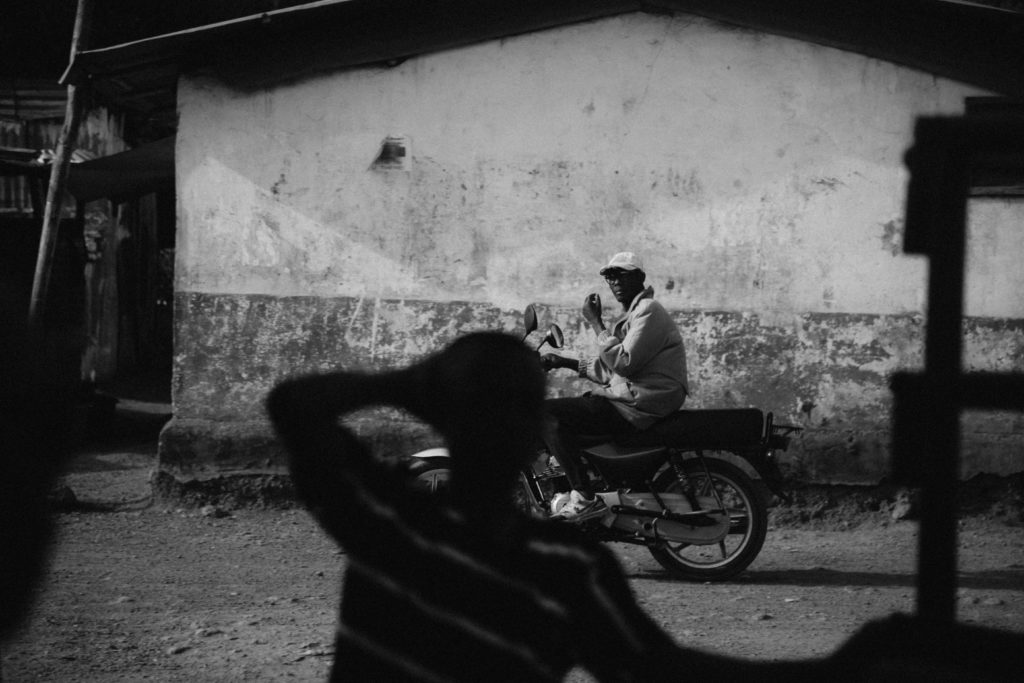
PUBLIC ENGAGEMENT
![]()
The project has involved extensive public engagement with international organisations, national and donor agencies, and think tanks. UN-level engagement has promoted long-term measurement of ex-combatant reintegration trajectories and outcomes; encouraged adoption of youth-centred methodologies and implementation of youth-led peacebuilding strategies; and, contributed to re-thinking policies of international assistance based on analysis of past gender mainstreaming and sustainable livelihood interventions.
Key public engagement activities, some funded by the University of St Andrews Impact and Innovation Fund, have included:
- ‘Liberia and the Role of Young People in Peacebuilding,’ an invited presentation by Folke Bernadotte Academy, Sweden’s government agency for peace, security and development, 29 Sept 2023;
- ‘Counter-Stigma Activities,’ invited presentation by United States Institute of Peace, Interagency Deep Dive on a Framework for Rehabilitation and Reintegration, Reducing Stigma and Facilitating Social Belonging, 28 Oct 2023;
- ‘Module 3: Reduce Stigma,’ invited peer review and consultation, United States Institute of Peace, Violent Extremism Disengagement and (Re)integration Action Guide, July 2022;
- Invited consultation, Integrated Disarmament, Demobilization and Reintegration Training Group (IDDRTG) and Bonn International Center for Conflict Studies (BICC), extraordinary meeting of the IDDRTG in Bogota and Cali, Colombia, 11–16 July 2022;
- Invited presentation, Integrated Disarmament, Demobilization and Reintegration Training Group (IDDRTG) and Bonn International Center for Conflict Studies (BICC), extraordinary meeting of the IDDRTG in Accra, Ghana, invited presentation and consultation, 4–5 November 2021.
- ‘Stigma Reduction,’ an invited consultation by the United States Institute of Peace for its project, Violent Extremist Disengagement and Reconciliation, 2 July 2021;
- ‘Research Perspectives on the Public Information and Strategic Communications during Disarmament, Demobilization, and Reintegration (DDR),’ an invited consultation by the United Nations Department of Peace Operations/Office of Rule of Law and Security Institutions/Disarmament, Demobilization, and Reintegration Unit and the research group on UN Media and Peace Processes (RUNMAPP) at the Centre for Freedom of the Media (CFOM), Sheffield University, invited consultation, 25 June;
- ‘Contributing to a Peaceful, Inclusive and Sustainable Society in Liberia,’ an invited presentation and consultation for the Research-Policy Dialogue Workshop, Implementation of Swedish Bilateral Development Cooperation Strategy for Liberia, Swedish Development Cooperation Agency and Folke Bernadotte Academy, 18 June 2020;
- ‘Pink Panthers: Gender, Peacebuilding, and Motorcycling in Liberia,’ a presentation and film screening at the invitation of the British Permanent Mission to the United Nations, 6 Dec 2019;
- ‘Youth-designed and -Led Support in Liberia,’ a presentation, panel discussion, and film screening at the invitation of the United Nations University, War Child, and UNICEF at UNICEF House, ‘Nothing About Us Without Us: Participatory Policy Research with Children and Youth Affected by Conflict,’ 25 Nov 2019;
- ‘Community-Motorcyclist-Police Tensions & Insecurity in Liberia: Violence Prevention & Reduction Strategies and Non-Formal/Formal Security Cooperation,’ a presentation at the invitation of the United Nations Department of Peace Operations, Office of Rule of Law and Security Institutions, Security Sector Reform Section, Folke Bernadotte Academy Research-Policy Dialogue, ‘Security Sector Reform in Fragile and Conflict-affected States: Towards the Next Generation?’ 6 Sept 2019;
- ‘Assessing and Conceptualizing Long-term Reintegration Outcomes,’ a presentation at the invitation of the United Nations Department of Peace Operations, Office of Rule of Law and Security Institutions, Disarmament, Demobilization and Reintegration (DDR) Section, 24 July 2019.
COUNTER-STIGMA AND SOCIAL REINTEGRATION
![]()
Young motorcycle taxi drivers also face critical challenges often unaddressed by development assistance: health and safety threats, police harassment, and ongoing, serious social stigmatisation. Social reintegration assistance has also been under-prioritised in DDR assistance for ex-combatant and conflict-affected youth after war. This project has worked with cyclists to identify the drivers of social stigmatisation and to analyse and support young people’s own strategies to counter it.
Several collaborative research activities have focused on redressing social stigmatisation in the sector. The project has convened police-cyclist dialogue groups in areas where violence has occurred. And, later in 2020, it will implement a nationwide bumper sticker campaign and series of radio broadcasts, designed to educate cyclists about road safety and violence prevention, and to educate communities about cyclists’ contributions to economic growth, peacebuilding, and reintegration. The stickers and broadcasts will also highlight the key role that cyclists played during the Ebola crisis from 2014-2016 and will reveal the active role cyclists are playing in preventing the spread of COVID-19 and managing its effects on vulnerable communities.
The project also produced a short film on community perceptions of commercial motorcyclists to use in counter-stigma dialogue between communities and cyclists and in the project’s focus group discussions.
Community Perceptions Film used in Cyclist-Community Dialogue Groups
Runtime: 15:44 mins
Main Credits
Director/Producer Jaremey McMullin
Camera Matthew Hyndman
Editor Tanja Schangin
Research Assistance Kennedy K. Berrian
IMPACT GENERATION ACTIVITIES
![]()
The project has designed and implemented several additional impact-generation activities in Liberia, working closely with parking station managers, the commercial motorcyclists’ unions and national federation (FOMTUL), and Platform for Dialogue and Peace, a Liberian civil society organisation.
Key project impact activities and outcomes are:
- Policy report: ‘The Legacy of DDR in Liberia,’ commissioned by the United Nations Department of Peace Operations, Office of Rule of Law and Security Institutions, Disarmament, Demobilization and Reintegration Section (2020)
- Documentary short film series: Liberia: Legacies of Peace, profiling everyday peace contributions of grass-roots Liberian actors (2019)
- Community-cyclist dialogue groups: four groups convened to discuss peaceful dispute resolution and to gauge impact of community perceptions and stigma of cyclists (2019)
- Police-cyclist dialogue groups: 24 groups convened to discuss and mediate prevention of roadside accidents, police-cyclist violence, and peaceful enforcement of COVID-19 prevention and management policies (2020 and 2021)
- Nationwide bumper sticker campaign: 5,000 bumper stickers written and designed by cyclists to counter social marginalisation and address other themes of key importance to them
- ‘FOMTUL Hour’ radio broadcasts: weekly radio broadcasts across three nationwide stations (Cool FM 91.9 FM, Radio Monrovia 92.1 FM, and Truth 96.1). The Federation of Motorcyclists and Tricyclists Unions of Liberia (FOMTUL) wrote and produced the broadcasts, which highlight challenges of police brutality and exploitation, violence prevention, roadside accidents, social stigma of motorcyclists, and livelihood issues linked to COVID-19.
INVITED PAPERS
![]()
- ‘Motorcycling as Post-War Reintegration: Assessing Youth Peacebuilding Strategies in Liberia,’ Folke Bernadotte Academy (Sweden’s government agency for peace, security and development), FBA Research Day, 28 Sept 2023;
- ‘“Suffering That Only Men Can Withstand”: Gendered Aspirations and Distortions in Research with Conflict-affected Youth in Liberia,’ International Studies Association Annual Convention, Montreal, March 2023.
- ‘“What Is the Benefit of this Project? Space, Representation, Participation, and Impact Generation in Research on Conflict-affected Youth,’ Varieties of Peace Network, University of Uppsala, ‘Challenges of Making Peace Researchable—Methodological Pluralism, Opportunities and Pitfalls,’ 9-10 June 2021;
- ‘SSR Is from Mars, DDR Is from Venus: Gendered Need Interpretation during Liberia’s Security Sector Reform Process,’ Eberhard Karls Universität Tübingen, ‘Analysing Gender, Practices, and Social Change,’ 14-15 Jan 2021;
- ‘Always Re-integrating: Ex-combatants’ Counter-Stigma Strategies and The Stigmatising Politics of DDR,’ Folke Bernadotte Academy/Politics after War Research Group/United Nations DPO/OROLSI/DDR Section, ‘From Armed to Non-Armed Politics: A series of virtual seminars initiating a research-policy dialogue on the political dynamics of disarmament, demobilization, and reintegration (DDR), 4 Dec 2020;
- ‘“Put Down” But Not Out: Demobilized AFL Personnel in Liberia and Implications for DDR/SSR,’ Folke Bernadotte Academy and New York University, New York City, ‘Security Sector Reform in Fragile and Conflict-affected States: Towards the Next Generation?’ 4-5 Sept 2019;
- ‘Motorcycling as Relational Peace in Liberia,’ University of Uppsala, ‘Varieties of Peace: Relational Peace,’ 7-8 May 2019;
- ‘Livelihoods for Conflict-Affected and Ex-Combatant Youth: The Case of Commercial Motorcycling in Liberia,’ Folke Bernadotte Academy, Stockholm, ‘Recidivism, Recycling or Reintegration? Revisiting DDR,’ 3-4 Nov 2018.
INVITED TALKS
![]()
- ‘The Role of Responsible Business Conduct in Natural Resource Management – The Case of Sustaining Peace in Liberia,’ Second International Conference on Environmental Peacebuilding, The Graduate Institute Geneva, Roundtable organized by Swedwatch, 3 Feb 2022;
- Film Screening of Diamond Boys, Second International Conference on Environmental Peacebuilding, The Graduate Institute Geneva, 1 Feb 2022;
- ‘Between Concepts and Reality: How to Deal with Armed Groups in Transition Phases of Violent Conflict?’ Bonn International Centre for Conflict Studies (BICC) International Conference, 11-12 Nov 2021;
- Discussion and Q&A of Best Man Corner, Toronto Motorcycle Film Festival, moderated by Kristen Midura (Founder, Engines for Change), 24 Sept 2021;
- ‘Extraction and Erasure,’ Mimesis Documentary Festival, University of Colorado Boulder, live panel discussion with MDF filmmakers around representational media’s engagement with extraction, 9 Aug 2021;
- ‘Ex-combatants’ Counter-Stigma Strategies and The Stigmatising Politics of Disarmament, Demobilisation and Reintegration,’ King’s College London, 30 June 2021. Plus film screening of ‘Community Perceptions of Commercial Motorcyclists in Liberia’.
- ‘Livelihoods for Conflict-affected and Ex-combatant Youth: The Case of Commercial Motorcycling in Liberia,’ Centre for Conflict Studies, Philipps-University Marburg, 10 Dec 2019. Plus film screening of Best Man Corner.
- ‘Pink Panthers: Gender, Peacebuilding, and Motorcycling in Liberia,’ Center for Global Affairs, New York University, 4 Dec 2019. Plus film screening of Pink Panther.
- ‘Seeing Ex-combatants, Siting Reintegration within Liberia’s Motorbike Hustle,’ Centre for Peace Studies, University of Tromsø, 15 Nov 2019. Plus film screening of Best Man Corner.
- ‘Youth Reintegration Trajectories,’ Faculty of Political Science, University of Belgrade, 8 Nov 2019. Plus film screening of Best Man Corner.
- ‘“Put Down” But Not Out: Demobilized AFL Personnel in Liberia and Implications for DDR/SSR,’ Folke Bernadotte Academy, Stockholm, 4 Apr 2019;
- ‘Livelihoods for Conflict-affected and Ex-combatant Youth: The Case of Liberia,’ Danish Institute for International Studies, Copenhagen, 30 May 2018;
- ‘Gender, Livelihood, and Conflict-affected Youth: The Case of Commercial Motorcycling in Liberia,’ Lund University, Gender Research Group, 28 May 2018.
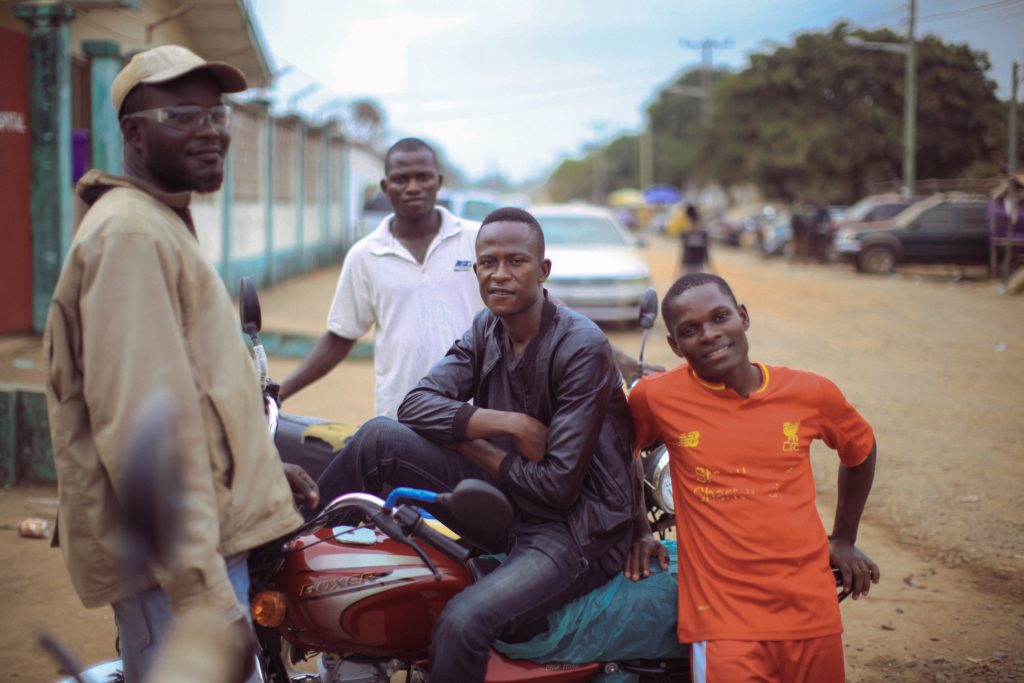
All photographs by Matthew Hyndman and FOMTUL
Research assistance and facilitation in Liberia provided by: Matthew Hyndman, Kennedy K. Berrian, Moses S. Sah, James S. Shilue, A. John F. Kenyor, Trokon G. Gray, Emmanuel A. A. Sarty, Alexander T. Devine, Emmanuel B. Morris, Lawrence S. Kromah, Maude V Yardamah, and Victor S. Malu.

